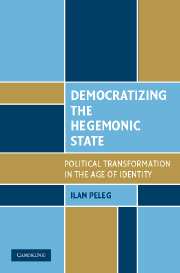Book contents
- Frontmatter
- Contents
- Preface
- Introduction
- 1 Ethnonational Conflict in Multinational Polities
- 2 The Crucial Triangle: Democracy, Statehood, and Hegemony in Multinational Settings
- 3 Classifying Multinational States
- 4 Transforming Uni-national Hegemony in Divided Societies: The Gradual Option
- 5 Transforming Uni-national Hegemony: Megaconstitutional Engineering
- 6 The Reverse Trend: Sustaining or Strengthening Ethnic Hegemony
- 7 Beyond Hegemony in Deeply Divided Societies: Transforming Hegemonic Systems
- References
- Index
7 - Beyond Hegemony in Deeply Divided Societies: Transforming Hegemonic Systems
Published online by Cambridge University Press: 27 October 2009
- Frontmatter
- Contents
- Preface
- Introduction
- 1 Ethnonational Conflict in Multinational Polities
- 2 The Crucial Triangle: Democracy, Statehood, and Hegemony in Multinational Settings
- 3 Classifying Multinational States
- 4 Transforming Uni-national Hegemony in Divided Societies: The Gradual Option
- 5 Transforming Uni-national Hegemony: Megaconstitutional Engineering
- 6 The Reverse Trend: Sustaining or Strengthening Ethnic Hegemony
- 7 Beyond Hegemony in Deeply Divided Societies: Transforming Hegemonic Systems
- References
- Index
Summary
Everything is foreseen but free will is given.
Rabbi Akiba, Pirkei Avot 3:15The Terminological Debate: The Nature of Ethnohegemony
This study demonstrated through both theoretical analysis and a series of empirical cases that several types of cooperative relationships might develop between an ethnically dominant group and a minority in deeply divided societies. Lijphart's concept of consociationalism and the vast literature on federalism and autonomy (and even the more limited one on cantonization) have focused on the possibilities of interethnic accommodation through power sharing or power division. The assumption of this literature, borne out by several examples used in the current study, is that ethnically differentiated groups are not necessarily destined to live in endless, bloody conflict.
Focusing on hegemonic states, however, this volume has covered not only cooperative options but also situations where one group dominates other group(s). To analyze such domination, Yiftachel has introduced the notion of ethnocracy in an important series of publications (1998, 2000b, 2001, 2006). Yiftachel's conceptualization is insightful. However, its foundational dichotomy between democracy and ethnocracy is overdrawn and, consequently, loses its potency as an analytical tool when applied to many (although by no means all) specific cases. Yiftachel argues, in effect, that regimes that promote an ethnic agenda are no longer democratic but are ethnocratic, a different and new regime type. The difficulty in accepting that logic is that numerous regimes, some included in this study (e.g., Estonia, Israel, and Turkey), although adopting on occasion democratically questionable methods, are by most standards democratic.
- Type
- Chapter
- Information
- Democratizing the Hegemonic StatePolitical Transformation in the Age of Identity, pp. 192 - 212Publisher: Cambridge University PressPrint publication year: 2007

